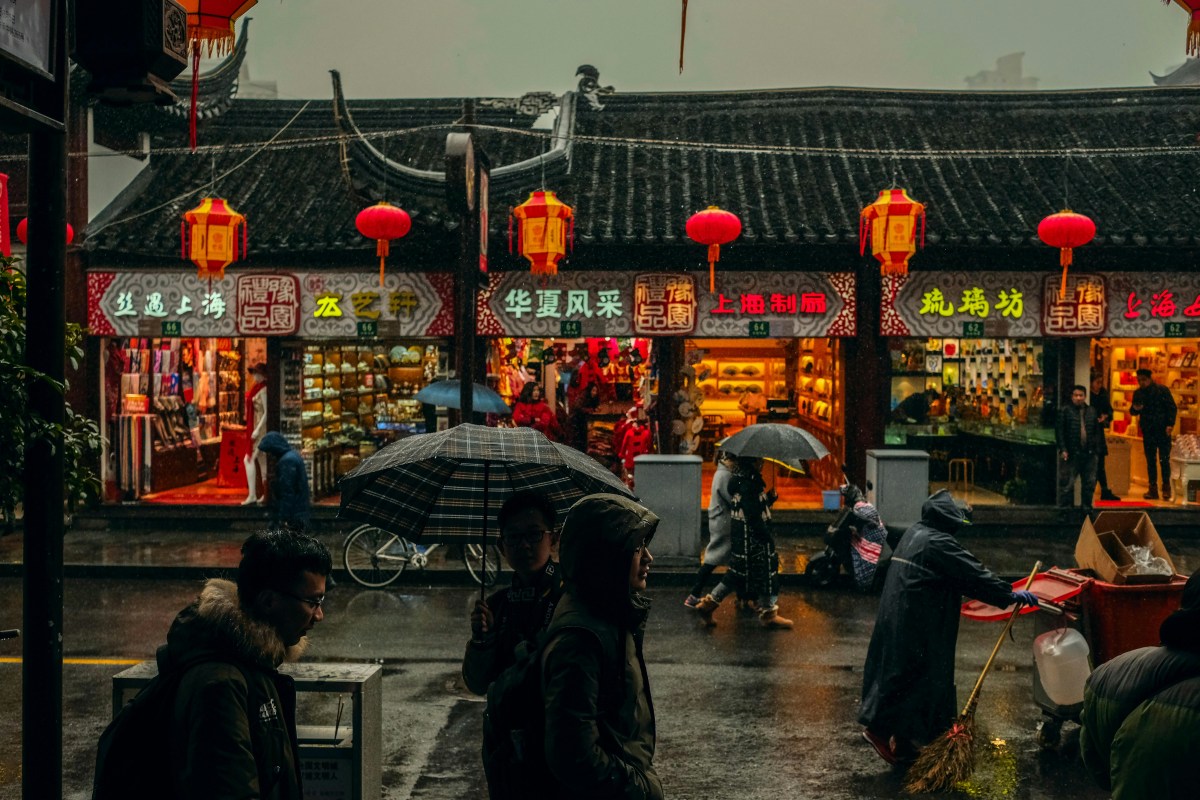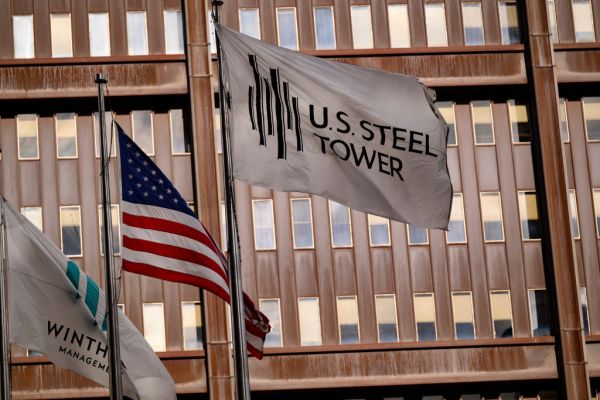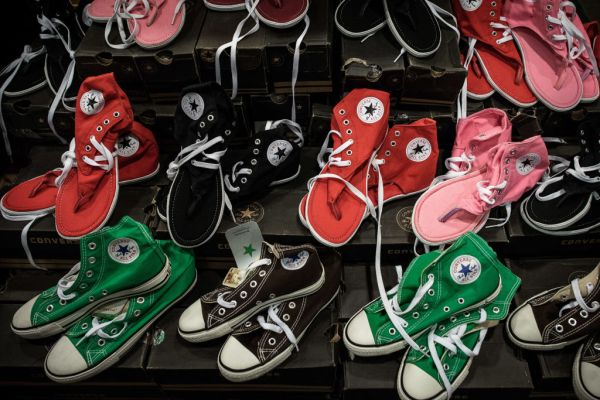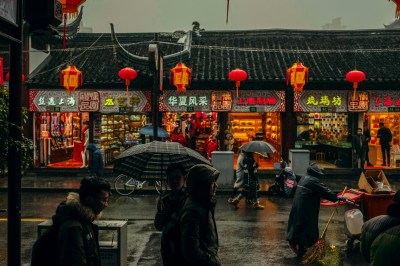Happy Wednesday! Monday was redemption day for competitive eater Joey Chestnut, who was uninvited from this year’s annual Nathan’s Famous Fourth of July hot dog eating contest due to his endorsement of a vegan hot dog. But Chestnut cemented his status as the greatest of all time earlier this week, downing 83 hot dogs in 10 minutes and easily beating Japan’s Takeru Kobayashi, who came out of retirement to eat a measly 66.
You come at the king, you best not miss.
Quick Hits: Today’s Top Stories
- Ukrainian President Volodymyr Zelensky said yesterday that a Russian aerial attack on the central Ukrainian city of Poltava on Tuesday killed at least 50 people, some of whom were soldiers, and injured 270 others after two ballistic missiles hit a military educational facility and a hospital. Ukrainian authorities reported they were conducting search operations to find more than a dozen people believed to have been buried under the rubble. Zelensky also renewed pleas for additional air defense systems from the West and for Western countries to remove restrictions on the use of long-range missiles to strike deep in Russia. “We say again and again to everyone in the world who has the power to stop this terror,” Zelensky said. “Air defense systems and missiles are needed in Ukraine, not somewhere in a warehouse.”
- Later on Tuesday, Zelensky said in an interview that Ukraine plans to hold onto territory it has seized in Russia’s Kursk region, describing it as essential to his “victory plan” while adding that Ukraine has no long-term interests in admitting the land within its national borders. “We don’t need their land. We don’t want to bring our Ukrainian way of life there,” Zelensky said. “For now, we need it.”
- According to Ukrainian public broadcasting, a Ukrainian supervisory board on Tuesday fired Volodymyr Kudrytsky, the CEO of Ukrenergo, the country’s state-owned electricity grid operator, which has faced criticism in recent months for its supposedly inadequate measures to protect electrical infrastructure. Other Ukrainian outlets reported yesterday that the board’s decision to sack Kudrytsky was hastened by the immense damage to Ukraine’s energy infrastructure that Russian airstrikes inflicted over the weekend. Two Ukrenergo board members resigned in protest to the chief executive’s dismissal, saying the supervisory board’s decision was “politically motivated” and that there was “no grounds for it.”
- British Foreign Secretary David Lammy announced on Monday the United Kingdom would immediately suspend part of its weapons shipments to Israel, citing concerns that the weapons could be used to transgress international humanitarian law. The move by British Prime Minister Keir Starmer’s government—in power since early July—will suspend 30 of the 350 arms export licenses the country currently has in place with Israel. “The assessment I have received leaves me unable to conclude anything other than that for certain UK arms exports to Israel there does exist a clear risk that they might be used to commit or facilitate a serious violation of international humanitarian law,” Lammy told the country’s parliament, though he added that there is “no doubt” Hamas endangers civilians by embedding itself in civilian infrastructure. Israeli Prime Minister Benjamin Netanyahu labeled the decision—which came on the heels of Hamas’ execution of six hostages in Gaza—“shameful,” and former British Prime Minister Boris Johnson accused Starmer and Lammy of “abandoning Israel.”
- The U.S. Justice Department on Tuesday unsealed terrorism charges against seven of the top leaders of Hamas, including posthumously charging the former political head of the terrorist organization, Ismail Haniyeh, as well as Haniyeh’s successor, Yahya Sinwar. Two others charged are also deceased. The seven have, according to the DOJ’s indictment, overseen and enabled decades of terrorism by Hamas, including organizing the October 7 attack on Israel. “We are investigating Hersh [Goldberg-Polin’s] murder, and each and every one of Hamas’ brutal murders of Americans, as an act of terrorism,” said Attorney General Merrick Garland, referring to Hamas’ recent execution of Goldberg-Polin, whom it was holding hostage in Gaza. “The charges unsealed today are just one part of our effort to target every aspect of Hamas’ operations. These actions will not be our last.”
- A Venezuelan judge on Tuesday issued an arrest warrant for Edmundo González—the opposition candidate whom the U.S. government declared the legitimate victor of the country’s presidential election last month—on seemingly trumped-up charges of criminal conspiracy. Venezuela’s authoritarian dictator, Nicolás Maduro, and his government are widely believed to have reported fraudulent electoral results in favor of Maduro, sparking nationwide protests. Authorities have been unable to detain González, whose whereabouts are unknown, and he has not made any public appearances since the day after the election.
- At least 129 people died on Tuesday—and 59 more were injured—after security forces thwarted an attempted mass jailbreak at a high-security prison in the Democratic Republic of Congo’s capital city, Kinshasa, resulting in a stampede among the inmates. Security guards shot and killed 24 inmates attempting to escape after initial warning shots, according to Congo Interior Minister Jacquemain Shabani. He added that “jostling” and “suffocation” were responsible for the remaining deaths. It’s unclear whether any prisoners successfully escaped.
- The FBI on Tuesday arrested Linda Sun, a former senior aide to New York’s Democratic Gov. Kathy Hochul, on charges of allegedly working as an unregistered foreign agent for the Chinese government. The 65-page indictment alleges Sun used her position to benefit the Chinese Communist Party (CCP) in exchange for financial kickbacks, including millions of dollars, as well as gifts and benefits to her friends and family. Sun and her husband—who was arrested and indicted alongside her—face 11 federal charges for carrying out requests from the Chinese government and CCP, including blocking Taiwanese officials from access to senior New York state officials even as they greenlit that access for Chinese officials. A spokesman for Hochul said Sun’s employment was “terminated” in March 2023 when the governor’s office discovered “evidence of misconduct.”
- At least 12 migrants, including six children, died on Tuesday—and several others were injured—when a small boat carrying more than 60 people capsized in the English Channel shortly after it departed northern France for the English coast. Rescuers have retrieved at least 50 people from the water, and search operations are still ongoing for two additional migrants who are missing. The incident is the deadliest such episode this year in the English Channel, where migrants, aided by human smugglers, routinely try to cross into the United Kingdom.
The Economy Xi Wants

China’s economic woes have been the subject of many a headline over the last few years, and the bad vibes appear to be reflected in the country’s online sentiment, with censors and state media trying to stifle discussions about a new era of Chinese economic decline affectionately referred to as a “garbage time of history.”
Signs of the country’s struggles continue to abound, but Beijing is doubling down on “Chinese-style modernization” policies that some economists argue will worsen the distortions already plaguing the world’s second-largest economy as trade tensions with the U.S. and other developed economies remain elevated.
After China eased its “zero-COVID” lockdown policies in late 2022, the Chinese Communist Party (CCP) hoped the country’s economy would come roaring back to pre-pandemic growth levels that had once been a feature of modern Chinese markets—China’s economy grew at an average annual rate of 9.5 percent between 1979 and 2018, according to World Bank data. But the economy is still sputtering a year and a half later, dragged down by a flagging real estate sector, overproduction, and weak consumer spending.
New data this summer did little to assuage fears about the state of China’s economy. Gross domestic product (GDP) grew by 4.7 percent in the second quarter of 2024, according to data released in July by China’s National Bureau of Statistics, the numbers from which are best digested with several grains of salt. While most developed economies would be thrilled with such a growth rate, the numbers came in below the expected growth of 5.1 percent. The Chinese government has set a target of 5 percent annual GDP growth, but many economists now see that growth as out of reach for 2024.
But those numbers may be even more disappointing in reality, perhaps a full percentage point or more below the reported numbers. China’s National Bureau of Statistics has a less-than-sterling record on other economic data: The agency suspended reporting on the youth unemployment rate after it reached a record high of 21.3 percent in June 2023. Instead, the agency adjusted its criteria to “optimize” the numbers and began releasing rosier reports in January of this year.
Among the most worrying sectors is real estate, which has experienced a steep decline over the last three years as giant property developers defaulted and collapsed. “The basic story over the past few years has been that China was an investment-led economy with an overwhelming proportion of that investment concentrated in the property market, in property construction, and the infrastructure sector,” Logan Wright—director of China markets research at Rhodium Group, an economic analysis firm—told TMD. “Those two sectors have declined very sharply.” New home sales by the top 100 Chinese developers fell 26.8 percent year-over-year in August, according to preliminary data released last week. New home prices in China fell 4.9 percent in July compared to a year earlier—the fastest drop in nine years—and used-home prices fell 7.9 percent.
Property investment in China dropped by 10 percent in the first six months of 2024, and foreign investment overall has also declined. Last month, the government restricted previously daily data on net investment in Chinese stocks from foreign funds to quarterly reporting. The move came in the wake of billions of dollars in foreign investment leaving Chinese stocks this summer. For only the second time since 1990—the first being November—foreign direct investment in China turned negative in the second quarter of 2024, both an indicator of and contributor to the weakening of the Chinese economy.
What has been the CCP’s answer to the economic headwinds? Largely staying the course. In July, the party convened its Third Plenum of the Central Committee—a major economic policy meeting once held every five years. The CCP reiterated its focus on industrial policy and boosting manufacturing and investments in technological innovation, referred to as “high-quality development.” What was absent were any detailed plans for turning the real estate market around or boosting consumer spending. The government announced a $70 billion lending program in May for local governments to buy up unsold properties and convert them to affordable housing units, which has faced a slow rollout that hasn’t seemed to make a dent in the housing market decline.
The overall policy orientation continues China’s state-driven economic development focused on manufacturing and production, with some emphasis on new tech sectors—efforts that seem to ignore prevailing economic wisdom that holds that robust consumer spending is the way to drive sustainable growth. Household spending among Organization for Economic Cooperation and Development countries—a collection of states with market economies—accounts for about 60 percent of GDP, but it’s only around 40 percent of China’s GDP.
Yet a focus on consumer spending, either through fiscal stimulus or broader economic reforms to expand private sector growth and incomes, doesn’t appear to be the goal of the CCP’s economic policy. “If you want to be like an OECD economy, then yes, you’d have to shrink the state sector, let private incomes rise, allow the private sector to expand into more areas, certainly including finance, if you want that kind of economy,” Derek Scissors—a senior fellow at the American Enterprise Institute and chief economist at the China Beige Book, a data-collection firm tracking the Chinese economy—told TMD. “But they don’t.”
“If you want the economy that they want, make sure we can control everything so there aren’t any destabilizing events,” he added, noting that tight state control of the economy prevented the housing glut from sparking a financial crisis, but will prolong the pain of climbing out of the bubble.
Chinese President Xi Jinping has expressed an aversion to any large fiscal policies to stimulate consumer spending and has previously criticized social spending programs as “welfarism” that breeds laziness. “As the party sees it, consumption is an individualistic distraction that threatens to divert resources away from China’s core economic strength: its industrial base,” Zongyuan Zoe Liu, a fellow in China studies at the Council on Foreign Relations, wrote last month.
The CCP’s commitment to manufacturing and production as the engine of economic activity necessarily led to excess capacity that has put the Chinese economy on a collision course with Western countries looking to protect nascent domestic industry in green energy and national security-sensitive sectors. “In prioritizing industrial output, China’s economic planners assume that Chinese producers will always be able to offload excess supply in the global market and reap cash from foreign sales,” Liu argued. “In practice, however, they have created vast overinvestment in production across sectors in which the domestic market is already saturated and foreign governments are wary of Chinese supply chain dominance.”
But the current economic hole likely can’t be filled by manufacturing. “[The property sector] was around 25 to 27 percent of GDP at its peak,” Wright told TMD. “As it has declined, nothing has taken its place.” He noted that China’s development in the green energy sector—namely batteries, electric vehicles, and solar panels—hasn’t come close to real estate’s previous share of the economy.
“China can’t maintain the same pace of economic growth post-pandemic after the property market collapsed,” he added. “The math does not add up at this point.”
Potentially complicating the economic picture, President Joe Biden announced a slew of new and increased tariffs in May on imports from China of electric vehicles (EVs), semiconductors, solar panels, critical minerals, and medical goods—although the administration has delayed the actual rollout which was originally set for August 1. Europe has followed suit with the European Commission imposing provisional tariffs on Chinese EVs. Our friendly northern neighbors announced tariffs late last month on Chinese EVs and steel and aluminum imports. Beyond tariffs, the Biden administration is also reportedly considering additional subsidization of the critical mineral industry in the form of a guaranteed price floor to help stabilize the financing of domestic projects.
It remains to be seen how effective these measures will be at combating cheaper Chinese exports, let alone successfully seeding domestic industry. Our own Scott Lincicome is skeptical to say the least, arguing that such industrial policies could drive up prices, create new gluts, and actually make domestic industry less competitive in the long run.
But policy trends in both China and the West seem to remain set on a more confrontational trajectory. For the CCP, the success of its own economic strategy will likely be measured more by its geopolitical effects than GDP growth, Scissors argued. “They’re trying to export their way to foreign dependence,” he said. “They’re not trying to export their way to growth.”
Worth Your Time
- Nature is capable of many wondrous feats, like creating the marvel that is a diamond—but then again, so are humans. “Lab diamonds are a testament to the principle that what nature can do, man is capable of doing better,” Javid Lakha argued for Works in Progress. “At the upper end of the market, it is not possible to tell the difference between lab diamonds and mined diamonds with the naked eye. … In Western civilization, a pernicious belief has taken hold, that what is ‘natural’ is good and what is man-made is inferior or harmful. Wordsworth, in his poem ‘The Tables Turned’, expresses it best: ‘Sweet is the lore which nature brings; Our meddling intellect Mis-shapes the beauteous forms of things; – We murder to dissect.’ But human intellect and the scientific method are the foundations of our prosperity. Nature is not a superior craftsman: it is our resource, and we can and should improve upon it. In materials science, this has been obvious for a long time. … Lab diamonds are a further testament to this.”
- Can you listen to too much music? “As Jars of Clay write in their song ‘Headphones,’ there is a temptation to retreat from real emotions through sound: ‘We go our separate ways … with our headphones on,’” Peter Biles observed in Plough. “Music yielded instances of healing, grace, and beauty, but I also used it to manufacture emotions and escape the burden of silence. … Letting music wash over every moment of life without cultivating places for quiet is like reading the classics and never pausing to reflect on their meaning. We become chronic skimmers, afloat in the ocean of noise with our eyes sleeplessly staring into space. Beautiful music has tended to hit me at unexpected times. ... I’ve never been able to wrangle a transcendent experience like a cowboy ropes an elusive bull. Every time I’ve tried, I’ve ended up restless and in an emotional flux—focused on myself instead of on the divine. One thing any of us can do, perhaps, is to choose to listen not only to music but to the silence. And we can listen to music in ways that brings us closer together rather than silos us.”
Presented Without Comment
The Hill: Trump On Why Powerful People Got Close To Epstein: ‘He Was A Good Salesman’
“He was a good salesman. He was a hailing, hearty type of guy,” Trump said. “He had some nice assets that he’d throw around like islands, but a lot of big people went to that island. But fortunately, I was not one of them.”
Also Presented Without Comment
Washington Post: Hvaldimir, Beloved Beluga Whale and Alleged Russian Spy, Found Dead
In the Zeitgeist
We have to admit that many entries in Rolling Stone’s list of the 100 best TV episodes were before our time—but some were just wrong. (The actual best episode of For All Mankind, for example, is “Hi, Bob.”) We can’t argue, though, with this episode of I Love Lucy cracking the top 20:
Toeing the Company Line
- In the newsletters: Nick enters the debate (🔒) over how traditional conservatives can best reform the Republican Party.
- On the podcasts: Chris joins Jonah on The Remnant for some rank punditry.
- On the site: Joseph Roche interviews Russian prisoners of war captured during Ukraine’s Kursk offensive, and Kevin weighs in on the idea of strategic voting.
Let Us Know
What would crack your own personal list of best television episodes of all time?









Please note that we at The Dispatch hold ourselves, our work, and our commenters to a higher standard than other places on the internet. We welcome comments that foster genuine debate or discussion—including comments critical of us or our work—but responses that include ad hominem attacks on fellow Dispatch members or are intended to stoke fear and anger may be moderated.
With your membership, you only have the ability to comment on The Morning Dispatch articles. Consider upgrading to join the conversation everywhere.